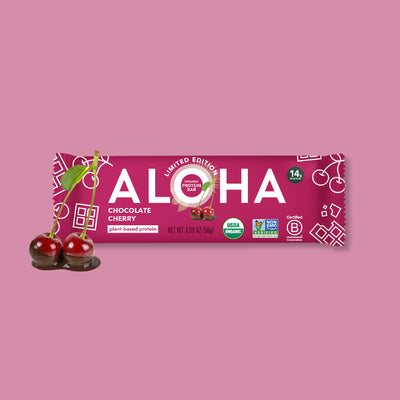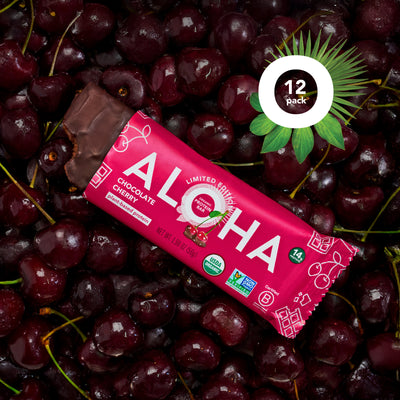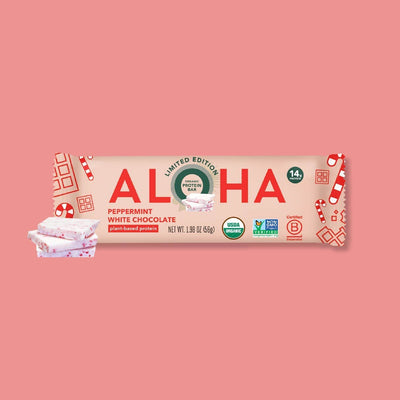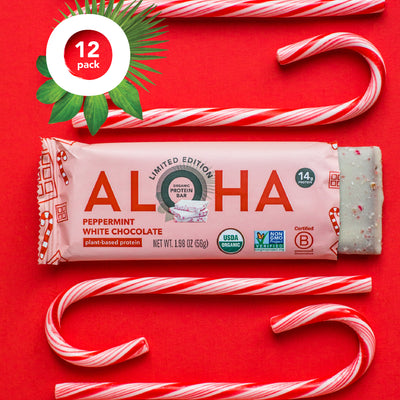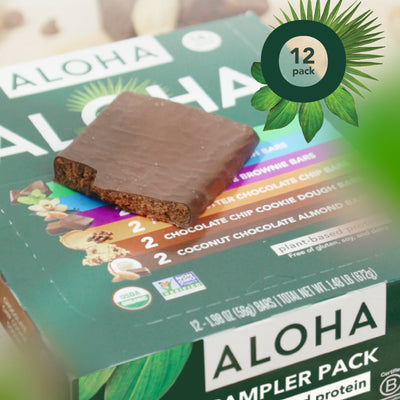Key Takeaways:
- Definition: A good protein snack includes quality ingredients, balanced nutrition, and lasting energy.
- Practicality: Protein snacks can fit into any time of day, not just after a workout.
- Smart Choices: Understanding labels and ingredients helps you avoid hidden sugars or fillers.
Snacks are supposed to help you get through the day, not slow you down. But finding ones that are both convenient and actually good for you can take some work. Protein snacks are popular because they support energy and help you feel full, but not every option on the shelf lives up to that promise. Knowing what to look for can help you snack smarter without overthinking it.
At ALOHA, we make plant-based snacks that work for real life. Our protein bars are USDA Organic, Non-GMO Project Verified, Certified Vegan, and made without soy or anything artificial. As an employee-owned Certified B Corp, we care about what goes into your food and how it’s made. That’s why we create snacks that are both good for your body and easy to bring along wherever the day takes you.
In this piece, we’ll be discussing what makes a good protein snack, how to choose one, and easy ideas to keep on hand for wherever life takes you.
What Makes a Protein Snack “Good”?
Not all protein snacks are created equal. While plenty of options line grocery store shelves, a good protein snack goes beyond the label on the front of the package. It starts with quality ingredients and a thoughtful balance of nutrients that support your energy, not just your cravings.
Protein is the star, but it works best when paired with healthy fats, fiber, or complex carbs. This combination helps you stay satisfied longer and supports steady energy. If a snack is packed with sugar or artificial ingredients, even a high protein count won’t make up for it.
A good protein snack also fits your lifestyle. It’s easy to take with you, doesn’t leave you feeling sluggish, and gives your body something it can actually use. You shouldn’t have to choose between convenience and nutrition.
Why Protein Snacks Work Anytime, Not Just After the Gym
Protein snacks aren’t just for recovery after a workout. Your body needs protein throughout the day to support muscle repair, help you stay focused, and keep your energy stable. That makes protein-rich snacks a smart option any time you need something filling.
They come in handy when you have a packed schedule and meals are spaced far apart. Reaching for something with protein can help prevent energy crashes and reduce the urge to snack on empty calories. Whether you’re heading out the door, stuck in traffic, or powering through a late afternoon slump, a protein snack can help you feel more balanced.
This kind of snack also keeps you feeling full longer. That means fewer cravings and more consistent energy, which can support whatever the day throws your way.
What Is a Good Protein Snack?
A good protein snack gives your body something it can use, not just something to fill a craving. It has enough protein to support energy and fullness, usually around 7 to 15 grams per serving, depending on your needs. But the amount isn't the only thing that matters.
What sets a snack apart is how it’s made. Whole food ingredients, minimal added sugars, and a balance of macronutrients help make a protein snack feel more like real food than just a quick fix. Look for sources like nuts, seeds, legumes, and clean plant proteins that provide lasting nourishment.
It should also be something you enjoy. Taste, texture, and convenience all play a part in whether a snack becomes a regular part of your routine. When it’s something you actually want to eat, you’re more likely to keep reaching for it.
Smart Protein Snack Ideas You Can Keep on Hand
The best protein snacks are the ones that are ready when you need them. Keeping a few go-to options nearby makes it easier to stay nourished between meals or when your schedule gets unpredictable.
Trail mix with nuts and seeds is a simple way to get protein, healthy fats, and crunch in one bite. Hummus with veggie sticks can be packed ahead of time and offers both fiber and plant-based protein. Hard-boiled eggs, while not plant-based, are often chosen for their convenience and protein content.
If you’re looking for something shelf-stable and easy to pack, protein bars can be a great choice. Just be sure to read the label and aim for options that are made with whole ingredients, not just added protein. ALOHA bars check those boxes and deliver the kind of balanced nutrition that fits into real life. You can also explore more healthy snacks that feel just as supportive as a full meal.
Some options are especially great for travel. Healthy snacks for traveling that keep up with real life, not just ideal moments, can help you stay consistent without having to settle for whatever’s available at a gas station or airport shelf.
How to Spot a Protein Snack That’s Actually Nutritious
A snack that’s high in protein isn’t always high in quality. To know if a snack is truly good for you, start with the ingredient list. Shorter is usually better, especially when the ingredients are ones you recognize and can pronounce.
Next, look at the sugar content. Many snacks marketed as “high-protein” are also loaded with added sugars, which can take away from the benefits. A good snack keeps the sweetness in check and uses natural sources when possible.
Check for protein sources you trust. Plant-based options like pumpkin seed, brown rice, or pea protein are often easier to digest and come from whole food ingredients. Also, be mindful of fillers, artificial flavors, and unnecessary additives.
Finally, consider how it makes you feel. A nutritious snack should leave you satisfied, not heavy or sluggish. If it supports your energy and fits your routine, that’s a good sign you’ve found the right one.
Our Favorite Plant-Based Snacks with a Protein Boost
Plant-based snacks can be both convenient and satisfying, especially when they’re made with ingredients that support your energy and taste good at the same time. ALOHA’s protein bars are a great example. They’re made with organic, whole food ingredients and provide 14 grams of plant-based protein per bar, without using soy, dairy, or artificial sweeteners.
They’re easy to pack, easy to eat, and come in flavors that feel like a treat, not a chore. Whether you need something after a workout or between meals, they offer a simple way to stay nourished. If you’re not sure where to start, this guide to the best protein bars highlights a few of our top choices.
Other great options include roasted chickpeas, almond butter on rice cakes, or blended smoothies with a scoop of clean protein powder. The key is finding snacks that work for your schedule and help you stay full and focused without relying on processed ingredients.
Snacking Smarter Starts with Simple Swaps
You don’t have to overhaul your entire routine to make better snack choices. Sometimes, it’s as easy as switching one processed item for something with a little more protein and a lot more intention. These small shifts can make a big difference in how you feel throughout the day.
If your usual snack is a bag of chips or a pastry, try something with protein that still satisfies your craving. ALOHA bars, nut butter with fruit, or a protein smoothie can all step in without feeling like a compromise. They offer steady energy and help you feel more satisfied between meals.
Good snacks also fit your lifestyle. Whether you’re traveling, working long hours, or just managing a full schedule, planning ahead with nourishing options helps you stay on track. You can also explore ALOHA’s full range of post workout snacks if you want something that works well after movement but still tastes great any time of day.
Final Thoughts
Protein snacks don’t need to be complicated. When they’re made with real ingredients and balanced nutrition, they can help you stay full, focused, and feeling good throughout the day. Whether you need something quick after movement, between meals, or while you’re on the go, having reliable options makes it easier to stay consistent with your choices.
Look for snacks that support your body, match your routine, and actually taste good. When protein is part of something you enjoy, it becomes less about restriction and more about nourishment. That’s what makes a snack not just better, but smarter.
Read also:
- Is Whey a Complete Protein? Your Burning Questions Answered
- Starting Your Gluten and Dairy Free Diet the Right Way
- What Is Cacao? Nutritional Benefits and Origins Explained
Frequently Asked Questions
Is it okay to eat protein snacks at night?
Yes, it’s perfectly fine. A protein-rich snack before bed can help you feel satisfied and may even support muscle recovery while you sleep. Just make sure it’s light, balanced, and not too high in sugar to avoid disrupting your rest.
How much protein should a snack have?
A good protein snack typically provides around 7 to 15 grams of protein. This amount is enough to help curb hunger and support energy without feeling too heavy. Your ideal intake may vary depending on your activity level and overall diet.
Can protein snacks help with weight management?
Yes, they can be helpful. Protein helps increase satiety, which may lead to fewer cravings and more stable energy. Including balanced protein snacks in your day can support mindful eating and reduce the urge to overeat later.
Are high-protein snacks safe for kids?
Most are safe when made with simple, whole food ingredients. For younger kids, be mindful of portion sizes and avoid snacks with added caffeine, sugar alcohols, or excessive sweeteners. It’s always a good idea to check with a pediatrician if you’re unsure.
What are portable protein snacks for work or school?
Great options include protein bars, trail mix with seeds and nuts, nut butter packs, or homemade oat balls with protein powder. These snacks are easy to carry, require little prep, and offer a steady source of energy during a busy day.
Can you get enough protein from snacks without supplements?
Yes, many snacks naturally provide protein without the need for powders or fortified products. Nuts, seeds, legumes, and plant-based bars can all contribute to your daily protein needs as part of a varied diet.
Are all protein snacks gluten-free?
Not always. Some protein snacks use binders or grains that contain gluten, so it’s important to check the label. If you’re following a gluten-free diet, look for certified gluten-free products made with clean, plant-based ingredients.
How often should I eat protein snacks in a day?
That depends on your goals and overall meal structure. For many people, one or two protein snacks per day can help maintain steady energy levels and reduce the chance of reaching for less balanced options.
Can protein snacks replace a meal?
In some cases, yes. If the snack has enough protein, fiber, and healthy fats, it can work as a light meal when you're short on time. However, regular meals still offer a wider range of nutrients and should be prioritized when possible.
What should I avoid in protein snacks?
Try to avoid snacks that rely heavily on added sugars, artificial flavors, or unnecessary fillers. Choosing products with a short list of recognizable ingredients usually leads to better nutrition and fewer unwanted additives.
Sources:
1. Fernández-Raudales, D., Yor-Aguilar, M., Andino-Segura, J., Hernández, A., Egbert, R., & López-Cintrón, J. R. (2018). Effects of High Plant Protein and High Soluble Fiber Beverages on Satiety, Appetite Control and Subsequent Food Intake in Healthy Men. Food and Nutrition Sciences, 09(06), 751–762. https://doi.org/10.4236/fns.2018.96057
2. Ni, D., Gunness, P., Smyth, H. E., & Gidley, M. J. (2021). Exploring relationships between satiation, perceived satiety, and plant‐based snack food features. International Journal of Food Science & Technology. https://doi.org/10.1111/ijfs.15102





